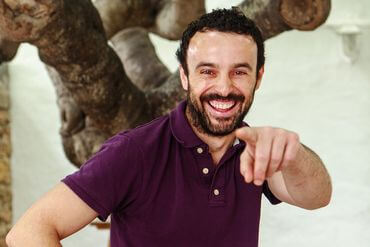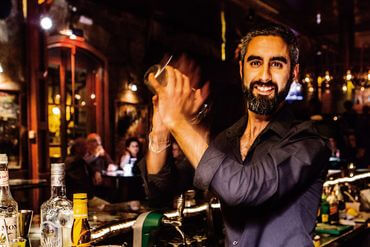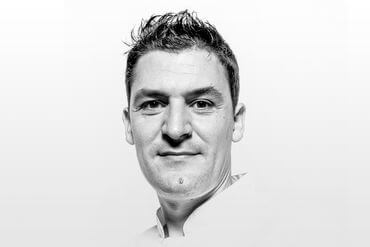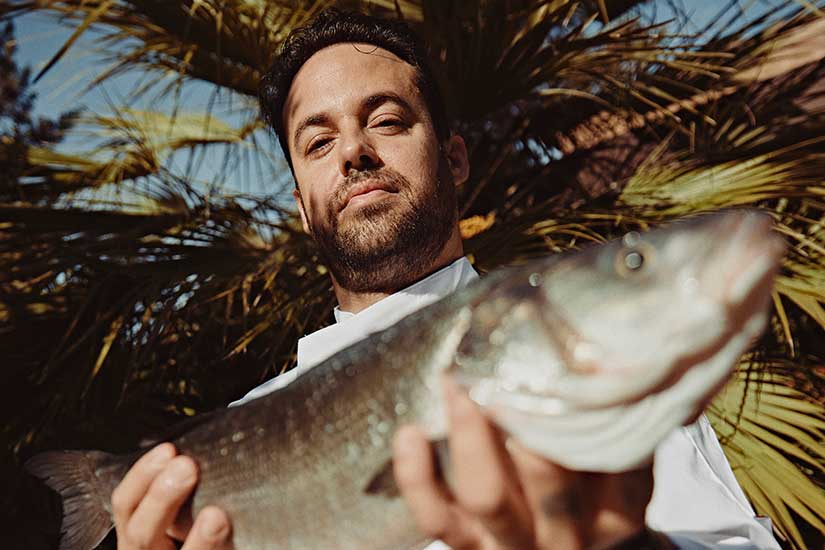
David Piernagorda
Cooking in paradise
Jockey Club is one of those places that has pure Ibizan style: one of the best beach club in Ibiza, that oozes elegance and exclusivity from its impressive natural setting, framed by gently undulating hills covered in a Mediterranean pine and juniper wood that practically runs down to the fine white sand. The restaurant is in Ses Salines, a stone’s throw from Ibiza Town and one of the most charming places on the White Isle.
Cordoba-born David Piernagorda (38) has been head chef at Jockey Club for five years, previously working in the Jockey kitchen for nine years. He describes his cooking style as a “Mediterranean fusion with traditional touches, such as an oven-roasted sea bass in Bilbao-style sauce, and other dishes with a more intense fusion, like curried mussels or ceviche with a twist.”

Jockey Club
The importance of choosing good produce
David Piernagorda believes that the produce you choose to use in your kitchen is absolutely key. In fact, several factors should be considered when choosing one product over another, such as its quality, availability, price fluctuations and whether or not it’s seasonal.
He goes even further, using the example of one of the menu’s star dishes, oven-roasted sea bass in Bilbao-style sauce, explaining that it would be impossible to make using wild sea bass. This is partly because wild sea bass is so hard to find due to EU fishing restrictions on the species, which in turn affects the product’s continuous availability and has a decisive impact on its fluctuating price. But there’s also a third point to bear in mind: the size. It’s extremely hard to buy wild fish at a specific calibre, making it particularly hard to price and serve consistent portions.
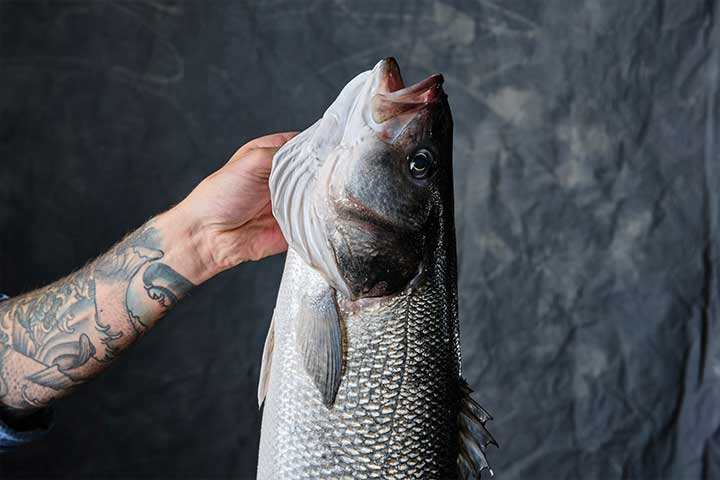
Sea bass
David Piernagorda has succeeded in overcoming these issues by using sea bass farmed by Aquanaria; since 2016 the company has farmed European bass in its offshore nurseries off the coast of Gran Canaria. In fact, the bass that is farmed at Aquanaria is the same species as the wild European bass (Dicentrarchus labrax). Its schools constantly swim in the cold, tumultuous waters of the Canary Islands so the fish develop strong muscles and have firm, marbled meat with a lightly iodine flavour. They’re perfect for roasting, eating raw and marinating, like in the ceviche dishes served at Jockey.
Chef David Piernagorda only sees advantages in using sea bass from Aquanaria. Firstly, because the fish are large in size, which is what he likes to work with, and secondly, because the size is standardized and the price doesn’t fluctuate. But, more than anything, it’s his preference because of the high-quality meat, which is practically identical to a wild sea bass. Further bonuses include its availability and freshness – according to Piernagorda, the company fishes on demand as chefs place their orders, so it couldn’t be any fresher.
Aquanaria: the sea bass used in great restaurants
A few years ago, it was unthinkable for a great restaurant or renowned chef to work with fish produced by marine aquaculture, even if it came from an offshore farm. Today, this mindset has changed thanks to the strict controls that fish are subjected to by companies such as Aquanaria. Among other achievements, the company certifies that its fish is anisakis-free due to constant veterinary check-ups. What’s more, the world’s oceans have been over-fished for decades and this type of aquaculture is being heralded as the only practical way of guaranteeing sustainable fishing.

Sea bass
Its firm, pearly-white meat, gentle flavour and great versatility – it can be cooked in virtually every way – meant that for many years sea bass was a star feature in top kitchens around the world. However, due to fishing restrictions, it has practically disappeared from the menus of leading restaurants. Or at least it would have done if it weren’t for Gustavo Larrazábal, a visionary who has farmed XXL European bass in Canary Islands waters since 2016, distributing his product around the world under the Aquanaria seal of quality.
The Aquanaria nurseries are in the deep, cold waters of the Atlantic Ocean off the coast of Gran Canaria. European bass (Dicentrarchus labrax), the same species as the wild sea bass, are farmed here in a clear sea that is constantly tossed by the trade winds. Wild sea bass is increasingly hard to find in the market because it’s subject to severe restrictions imposed by the EU, a measure that was introduced to tackle decades of unchecked overfishing of this species.




